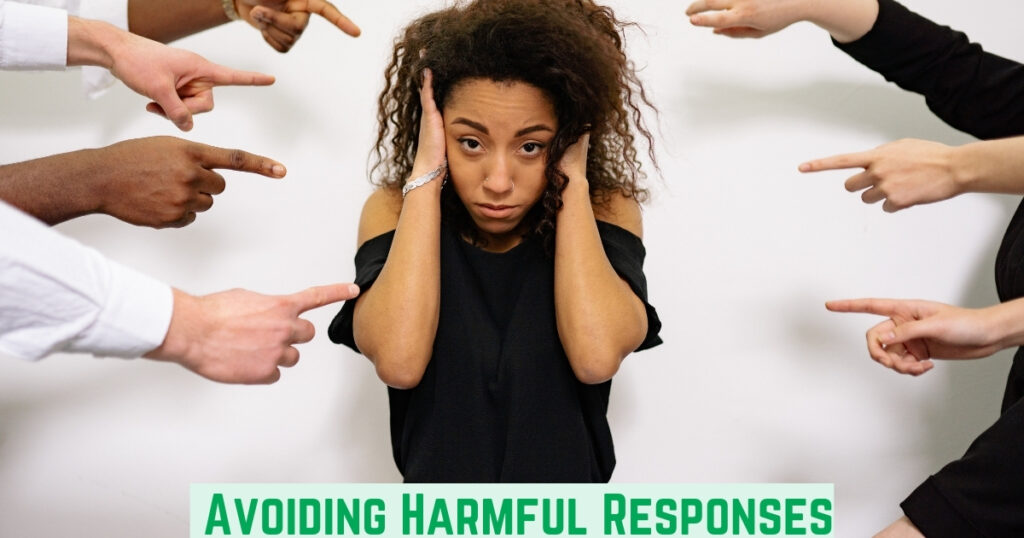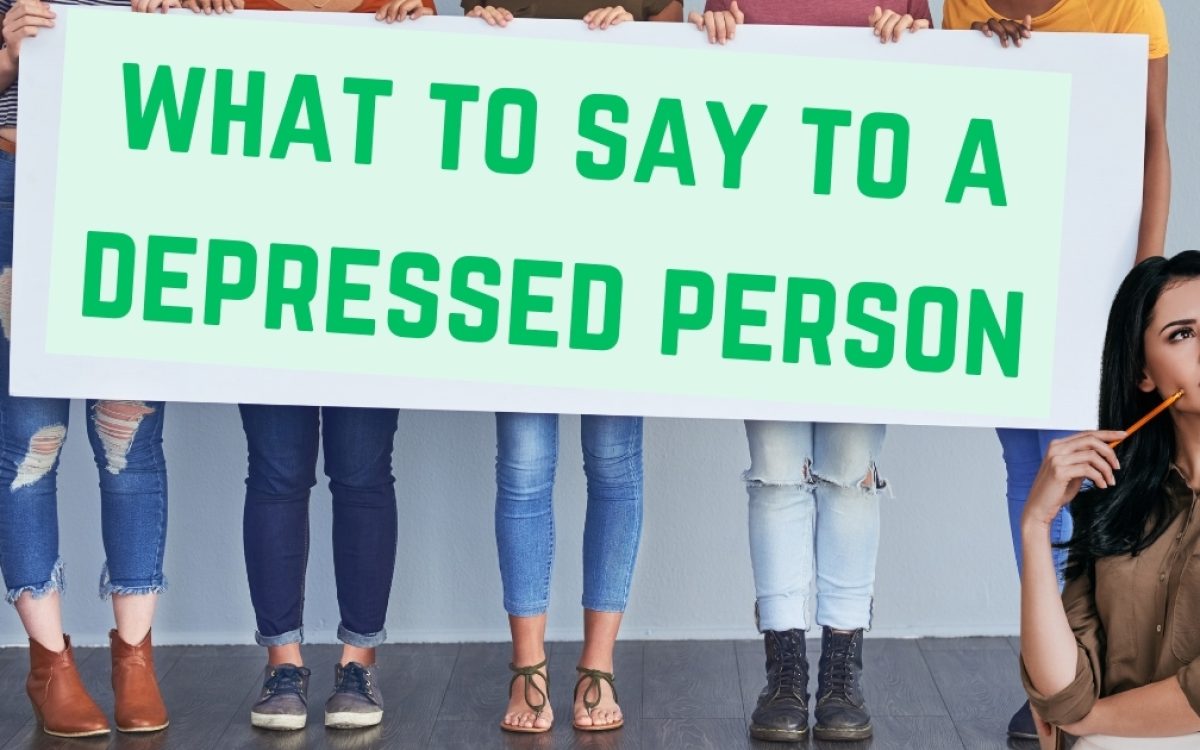Imagine this: You’re sitting across from a friend, and the air feels heavy with unspoken words. Their usual laughter is replaced by a somber tone, and you can see the world’s weight in their eyes. They’re struggling, and you want to help, but you need help figuring out where to start. It’s a familiar scenario that many of us encounter at some point in our lives.
In moments like these, when a loved one is battling depression, our words can be a lifeline or a stumbling block. It’s during these times that knowing what to say to a depressed person, and perhaps more importantly, what not to say, becomes crucial. Because while we may have the best intentions, our words can either offer comfort or inadvertently cause harm.
Table of Contents
ToggleUnderstanding Depression: A Brief Overview

Before diving into the delicate art of conversation with someone experiencing depression, it’s essential to grasp what depression truly entails. Depression isn’t merely feeling sad or having a bad day; it’s a complex mental health condition that affects millions worldwide. According to the World Health Organization, over 264 million people of all ages suffer from depression globally, making it a leading cause of disability.
Depression manifests differently in each individual, but common symptoms include:
- Persistent feelings of sadness.
- Loss of interest in once-enjoyable activities.
- Changes in appetite or sleep patterns.
- Difficulty concentrating.
- Even thoughts of self-harm or suicide.
It’s not just a fleeting emotion; it’s a pervasive state of being that can profoundly impact every aspect of a person’s life.
Research suggests that genetic, biological, environmental, and psychological factors can all contribute to the development of depression. It’s not a sign of weakness or a character flaw but rather a legitimate medical condition deserving of understanding and support.
Understanding the complexities of depression can help us approach conversations with empathy and compassion. It’s about recognizing that our words hold weight and that our presence can offer solace in times of darkness. So, let’s explore ten empathetic responses to provide support to someone battling depression. But before we do, let’s remember: listening with an open heart can be the most potent response.
Importance of Empathy in Supporting Someone with Depression

Empathy isn’t just a buzzword thrown around in self-help books—it’s a lifeline for those battling depression. Let’s break it down: when someone you care about is grappling with depression, it’s not just about saying the right words; it’s about truly understanding their experience and validating their feelings. Empathy is the glue that holds relationships together, especially during tough times.
Research backs this up. According to a study published in the Journal of Affective Disorders, individuals with depression often feel isolated and misunderstood by those around them. That’s where empathy swoops in to save the day. By stepping into their shoes and offering a listening ear without judgment, you create a safe space where they can open up without fear of rejection.
But why is empathy so crucial in the context of depression? Well, for starters, it’s a powerful antidote to the loneliness and stigma that often accompany mental health struggles. When you show empathy, you clearly say, “You’re not alone, and your feelings matter.” And let’s face it—feeling seen and heard can make all the difference when you’re navigating the murky waters of depression.
But empathy isn’t just a warm and fuzzy concept—it’s backed by science. Studies have shown that receiving empathetic support from loved ones can significantly improve mental health outcomes for individuals with depression. In other words, your empathy isn’t just a nice gesture; it’s a game-changer.
So, how can you cultivate empathy in your interactions with someone who is depressed? It starts with active listening. Please put down your phone, look them in the eye, and really listen to what they’re saying (and what they’re not). Ask open-ended questions, and resist the urge to offer unsolicited advice. Sometimes, just knowing that someone cares enough to listen is enough.
And here’s the thing: empathy isn’t a one-size-fits-all solution. What works for one person might not work for another. So, be flexible and adapt your approach based on their needs and preferences. Remember, empathy isn’t about fixing their problems—it’s about standing by their side and offering unwavering support, no matter what.
As we dive into empathetic responses to support someone with depression, let’s keep in mind that empathy isn’t just a nice-to-have—it’s a must-have. So, let’s roll up our sleeves, open our hearts, and show up for our loved ones in their time of need.
Subtle Signs of Depression to Look Out For

When it comes to depression, the signs aren’t always as clear-cut as we might think. Sure, we’ve all heard about the classic symptoms—persistent sadness, loss of interest in activities, changes in appetite or sleep patterns—but depression can manifest in subtler ways, too.
For instance, pay attention to any changes in behavior or mood that seem out of the ordinary. Is your friend suddenly withdrawing from social activities they once enjoyed? Do they need help with concentrating or making decisions? Do they seem more irritable or restless than usual? These could all be red flags indicating something deeper beneath the surface.
It’s also essential to recognize that depression can manifest differently in men and women. While women are more likely to experience traditional symptoms like sadness and guilt, men might be more prone to irritability, aggression, or reckless behavior. By familiarizing yourself with the subtle signs of depression, you can better support your loved ones and help them get the help they need.
Building Trust: Creating a Safe Space for Communication

Building trust is like laying the foundation for a sturdy house—it’s essential for creating a safe and supportive environment where open communication can thrive. When someone is struggling with depression, trust becomes even more critical. They need to know they can confide in you without fear of judgment or rejection.
So, how can you build trust with someone who is depressed? It starts with being reliable and consistent in your actions. Show up when you say you will, and follow your promises. Be patient and non-judgmental, even when they’re not at their best. Above all, listen actively and empathetically—let them know their feelings are valid and you’re there to support them every step.
Practical Tips for Initiating a Conversation About Depression
Talking about depression can be daunting, but it’s a crucial step in offering support to someone who is struggling. Here are some practical tips to help you initiate the conversation:
Choose the right time and place:
Find a quiet, private setting where you can talk without distractions.
Approach with empathy:
Let them know you care about and are concerned about their well-being.
Be gentle but direct:
Express your observations and concerns without placing blame or making assumptions.
Listen more than you speak:
Give them space to share their thoughts and feelings without interruption.
Offer support, not solutions:
Let them know you’re there for them, no matter what, and encourage them to seek professional help.
By approaching the conversation with empathy and sensitivity, you can create a safe space where they feel comfortable opening up about their depression.
Words of Comfort: 10 Empathetic Responses to Offer Support

When someone you care about is battling depression, your words can be a powerful source of comfort and reassurance. Here are ten empathetic responses to offer support:
- “I’m here for you, no matter what.”
- “You’re not alone in this—I’m with you every step of the way.”
- “It’s okay to not be okay. I’m here to listen whenever you’re ready to talk.”
- “Your feelings are valid, and I’m here to support you through them.”
- “I may not fully understand what you’re going through, but I’m here to support you however I can.”
- “You are loved, and your presence in this world matters.”
- “I’m proud of you for reaching out and asking for help.”
- “You’re stronger than you realize, and you have the resilience to overcome this.”
- “I believe in you, and I’m here to help you find the light at the end of the tunnel.”
- “You are worthy of love, happiness, and healing, and I’m here to remind you of that every step of the way.”
These words may seem simple, but they can make a world of difference to someone struggling with depression. So, speak from the heart and let them know they’re not alone in their journey toward healing and recovery.
Active Listening Techniques to Validate Their Feelings
Alright, let’s talk about listening. But not just any kind of listening—active listening. When someone opens up about their depression, it’s not just about hearing their words; it’s about truly understanding their emotions. That’s where active listening comes in.
Active listening isn’t just waiting for your turn to speak or zoning out while they talk. It’s about being fully present and engaged in the conversation, showing them you’re here for them in body, mind, and heart. Here are some techniques to help you master the art of active listening:
Paraphrasing:
Repeat what they’ve said in your own words to ensure you’ve understood them correctly. This demonstrates that you’re paying attention and gives them a chance to clarify any misunderstandings.
Reflecting feelings:
Acknowledge and validate their emotions by mirroring them back to them. For example, you might say, “It sounds like you’re feeling really overwhelmed right now. Is that accurate?” This shows you’re tuned in to their emotional state and empathizing with their experience.
Nonverbal cues:
Pay attention to your body language—maintain eye contact, nod your head, and lean in slightly to show that you’re actively listening. These nonverbal cues can convey warmth and receptiveness, making the person feel heard and understood.
By practicing active listening techniques, you can create a safe and supportive space where they feel comfortable opening up about their depression and know that their feelings are valid and respected.
Avoiding Harmful Responses: What Not to Say to a Depressed Person

Alright, let’s get real for a minute. Supporting someone with depression isn’t just about saying the right things; it’s also about avoiding the wrong things. And trust me, there are plenty of wrong things you can tell. Here are some phrases to steer clear of:
- “Just cheer up!”
- “It’s not that bad.”
- “You have nothing to be depressed about.”
- “Have you tried just thinking positive thoughts?”
- “Why don’t you just get out of bed and do something?”
- “You’re just being lazy.”
Yikes, right? These responses not only trivialize their experiences but also invalidate their feelings and make them feel even worse. Instead, focus on offering empathy, validation, and support—let them know that you’re here for them, no matter what, and that their feelings are valid and deserve acknowledgment.
Encouraging Professional Help: How to Offer Guidance Without Pressure

Let’s talk about the elephant in the room: professional help. Encouraging someone to seek therapy or counseling for their depression can be a delicate dance. On the one hand, you want to support them in getting the help they need; on the other hand, you don’t want to pressure or overwhelm them. Here are some tips for offering guidance in a supportive and non-judgmental way:
Express concern:
Let them know you’re worried about their well-being and want to help them get the support they need.
Normalize seeking help:
Remind them that seeking therapy or counseling is no different from seeking help for a physical ailment—it’s a sign of strength, not weakness.
Offer to help:
If they’re unsure where to start or feel overwhelmed by the idea of reaching out for help, offer to assist them in finding a therapist or counselor or accompany them to their appointments.
Respect their autonomy:
Ultimately, the decision to seek professional help is theirs to make. Respect their autonomy and agency in the process, and let them know that you’ll support them no matter their decision.
By offering guidance in a supportive and non-judgmental way, you can help them take the first steps toward getting the help they need to manage their depression effectively.
Continuing Support: Long-Term Strategies for Being There for Them
Supporting someone with depression isn’t just a one-and-done deal—it’s an ongoing journey that requires patience, understanding, and commitment. Here are some long-term strategies for being there for them:
Stay connected:
Check-in with them regularly, even when they seem to be doing better. Let them know you’re still here for them, even when the initial crisis has passed.
Educate yourself:
Learn as much as you can about depression and how it affects people’s lives. Understanding the condition can help you provide more effective support and empathy.
Be patient:
Recovery from depression takes time, and there may be setbacks along the way. Be patient with them and offer encouragement and support, even when progress seems slow.
Take care of yourself:
Supporting someone with depression can be emotionally taxing, so make sure to prioritize your own self-care and well-being. Seek support from friends, family, or a therapist if needed.
Encourage healthy habits:
Encourage them to engage in activities that promote mental and emotional well-being, such as exercise, mindfulness, and spending time with loved ones. Offer to join them in these activities to provide additional support and companionship.
By implementing these long-term strategies, you can continue to be a source of strength and support for them as they navigate their journey toward healing and recovery from depression.









